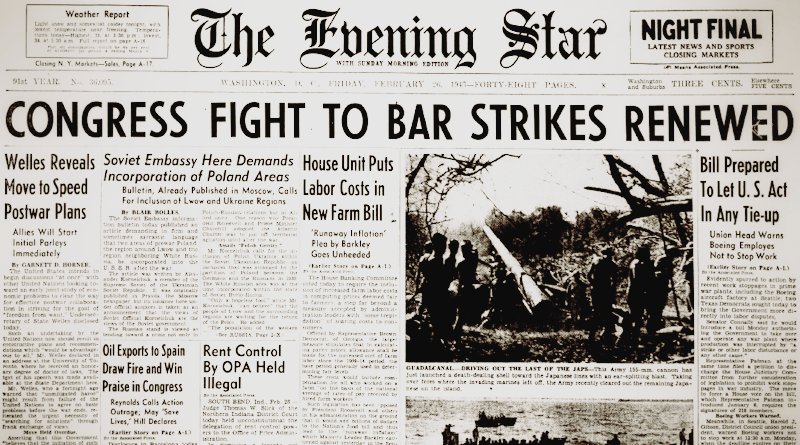World War II Chronicle: February 26, 1943
Page five reports that U.S. Army Air Force 2nd Lt. Robert E. Smith has earned the Air Medal for having crash-landed in Vichy France and making his way back to Spain before returning to England. Smith volunteered to fly for the Royal Air Force in 1941 and flew Spitfires for No. 133 (Eagle) Squadron… George Fielding Eliot column on page 10…
Sports section begins on page 17, which announces that former boxing champ Cpl. Barney Ross has returned from Guadalcanal and features a column by Grantland Rice.
Roving Reporter by Ernie Pyle
A FORWARD AIRDROME IN NORTH AFRICA — Once more I’m with the House of Jackson — the bomber crew I wrote about in England and again elsewhere in Africa. We follow each other around so much our reunions are getting to be commonplace.
They were out on a mission when I arrived at their remote airdrome. So I went out to their plane’s parking place, and was waiting when they came back.
The first man to drop out of the plane was Lt. Malcolm Andresen of Hixton, Wis., the navigator. We are good friends, and I hadn’t seen him for weeks, but he just grinned and said “Hi, Ernie,” and didn’t even shake hands, as though I’d been there all the time.
The House of Jackson is still perking, but the inevitable perils and shiftings of war are starting to whittle her down. Her skipper was Capt. Jack Traylor, of Wollaston, Mass. Now he has been promoted to ground work in an operations job, and takes the faithful old plane on its mission only once in a while.
He hates office work; just isn’t the type. But when I asked him if he didn’t chafe at being on the ground so much he said, “Hell No. If I never go on another mission it’ll suit me all right.” But later I noticed he was begging the squadron leader to let him go on one.
The bombardier is temporarily out of the crew too. He got a piece of flak in his left hand, and now goes around proudly with his arm in a sling. He is Lt. Joe Wolff, of Omaha.
He’ll be flying again in a few days, but the boys kid him about maybe he’ll get a ticket home, now that he’s wounded. Joe laughs too, but he wishes they weren’t just kidding.
There is no laughter about the ball-turret gunner. For he is dead. He is the one who loved his ball-turret so much that he even wanted to be in it while the plane took off; loved it so much he wouldn’t let anybody else get inside it.
His death was a brave one. When the Germans came over our airdrome one night this gunner jumped from the trench, where he was safe, and dashed to the nearest Fortress and began shooting at the enemy planes from the upper turret. A bomb landed nearby, and a small fragment tore through the side of the plane and went through his heart.
I was on the field that night, and the rest of the crew were asking their officers if they could take up a collection and send his body home. It is impossible, but they will mark his grave well, and maybe after the war it can be returned.
That night Lt. Andresen asked me if I could say something in the column about how wonderful the ball-turret gunner had been and how he had died, so his folks could read it. But I had to tell him it was impossible, because I can’t give his name.
There is a censorship rule which forbids us mentioning the name of a casualty until after his family has been notified by the war department. The rule is good, I think, but there’s no way for us over here to know when the war department has sent its telegram. Consequently the rule really forbids us ever mentioning casualties at all.
So all I can do is tell the little incident, and some day the other members of the crew will write to this brave gunner’s family and tell them how he died.
(Editor’s Note — The gunner was Sgt. John D. Wadkins, of Coolidge, Ariz. Ernie Pyle gave his name in a confidential postscript to this dispatch, for use if the war department confirmed that the next of kin had been notified. This the department has done.)
The Air Forces have a language all their own. One old Air Force expression has increased in popularity over here until now it substitutes for about 50 per cent of ordinary verbs. The expression is “sweating out.”
You “sweat out” a mission or you “sweat out” the weather or you “sweat out” a promotion. It means you wait, or you fight, or you do anything hard that takes some time.
Another much used expression is “rugged.” When you’ve been living in mud, that was “rugged.” When the flak over Bizerte has been especially bad, that was a “rugged” trip. Anything extraordinarily tough is “rugged.”
In the village near our airdrome there is a terribly crippled Arab kid about 10 or 12 years old, I’d judge. He can’t walk, and crawls on his stomach all over town through the dirt and filth.
And what have our soldiers done? Why, they’ve taken the wheels off a battery-carrier at the airdrome, and made a little wheeled platform for this kid to lie on, so he can roll along the streets instead of crawl.
Surprisingly all I can find on the House of Jackson’s crew is that Sgt. Wadkins served in the Eighth Air Force’s 301st Bomb Group at the time of his death. An obituary clipping states that he received the Distinguished Service Cross.
